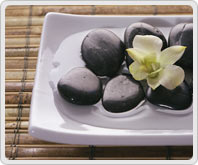Get introduced to the Healthy you, to the Beautiful you, to the Real you
00 91 987 357 9007
Origin and History of Spa

Etymologically the word 'Spa' was derived from the Walloon word ‘espa’ meaning fountain. Spa was the name of the Belgian town in the 14th century where a curative thermal spring was discovered. The origin of the term 'Spa' is from the Latin word 'spagere' which means to scatter, sprinkle, moisten or it may be an acronym of the Latin phrase 'sanitas per aquas' (health through water). This thermal water bath is known for its therapeutic effects and encompasses different kinds of therapies such as balneotherapy, spa therapy and hydrotherapy.
Historians believe that Greeks used variety of social bathing in 500 BC including hot air baths known as 'laconica' for medicinal purposes. In Rome Emperors designed and created several 'thermae' (a large-scale spa) so that the benefit of the curative features of hot water can be availed by common people. Gradually this became popular throughout the world and they were built across the Roman Empire, from Africa to England. People come to these places for treatment from various parts of the world which developed it into a medical profession. The increase in demand from visitors helped in emergence of several well equipped complexes which offered places to stay, entertainment facilities and various types of baths.
Hippocrates proposed the hypothesis on Spa according to which the imbalance of the bodily fluids is the cause of diseases. To regain the balance a change of habits and environment was advised, which included bathing, perspiration, walking, and massage. During early days baths were combined with sports, education and herbal treatments so that maximum benefits can be gained. Influenced by this hypothesis the Greeks and the Romans built their own thermal baths at mineral and thermal springs so that its medicinal treatment can be availed by soldiers and citizens. In Rome three different types of baths were developed which were known as baths at home (balnea), private baths (balnea privata), and public baths (balnea publica) that were run by the state. Later on, the public baths developed into huge and impressive edifices (thermae) with an accommodating capacity of thousands of people.
Throughout the centuries the spa industry continued to gain popularity and emerged as a sophisticated treatment of diseases. The present generation Spa therapies keep undergoing several reforms so that they can become more effective and efficient for the end users. Today Spa has highly developed into a profession that takes proper care of the individuals after proper diagnosis of the physical and mental disharmony. Increasing focus on health and wellness popularizes this treatment throughout the world. Nowadays along with bathing the emphasis is also laid on diet, exercise and recreational programs.
Rediscover tranquility with India Spa tours and feel the rejuvenating touch of mother nature!
-
 Spa in India
Spa in India - About Spa / Introduction
- Origin and History
- Spa Treatments
- India Spa Resorts
- Ananda Spa Resort
-
 Ayurveda in India
Ayurveda in India - About Ayurveda
- Origin and History
- Kerala Ayurveda
- Ayurvedic Therapies
- Ayurveda in Daily Life
- Ayurvedic Medicines
- Ayurveda Resorts / Shalas
- Kerala Ayurveda Resorts
-
 Yoga in India
Yoga in India - About Yoga
- Origin and History
- Types of Yoga and Yoga Positions
- Yoga Therapies
- India Yoga Centers
-
 Meditation in India
Meditation in India - About Meditation
- Origin and History
- Techniques and Postures of Meditation
- Benefits of Meditation
- India Meditation Centers
-
 Homeopathy in India
Homeopathy in India - About Homeopathy
- Origin and History
- Homeopathy Remedies
- Homeopathic Medicines
-
 Naturopathy in India
Naturopathy in India - About Naturopathy
- Origin and History
- Naturopathy Treatments
- Naturopathy Centers in India
Copyright © 2020, www.IndiaWellness.org
Recognized by Ministry of Tourism, Government of India
National Tourism Award Winner
Powered by SOFTTIX






